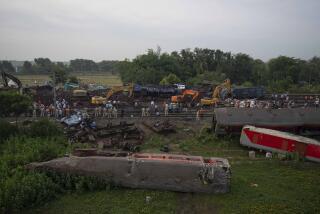India Identifies Suspects in Railway Attack
- Share via
MUMBAI, India — Under intense pressure to show progress, authorities identified their first suspects Thursday and detained about 20 people for questioning in connection with this week’s deadly railway bombings.
Indian media broadcast photos of two men believed to be linked to the string of rush-hour blasts Tuesday along this city’s crowded western commuter line, an attack that killed as many as 200 people and wounded hundreds. However, there were conflicting reports as to the suspects’ names, and authorities provided no background on the men or details on what their roles might have been.
This morning, police said a man known only as Rahil was also being sought, but they gave no more details, the Associated Press reported.
Police have interviewed hundreds of people and detained 20 for further interrogation, a police official said.
Authorities are under pressure to find those behind the bombings, the worst terrorist attack in 13 years here in India’s commercial and entertainment capital. But such investigations in India are often hampered by lack of coordination.
Most of those detained for further questioning hailed from predominantly Muslim neighborhoods in Mumbai’s suburbs, police said. Although there has been no official claim of responsibility for the attack, suspicion has focused primarily on an Islamic militant group known as Lashkar-e-Taiba, or Army of the Pure, which has waged a bloody battle to establish Muslim rule in the contested Himalayan territory of Kashmir.
India blames the organization for several bombings that rocked New Delhi in October and accuses archrival Pakistan of sponsoring the group. The regime in Islamabad denies that allegation, but sharp words between the two countries since the attack Tuesday have spurred fears that their slow peace process could bog down further.
A man purporting to represent a new Al Qaeda outpost called a Kashmiri news agency Thursday to applaud the bombings in Mumbai, formerly known as Bombay. The man spoke in Urdu, Pakistan’s national language, and boasted that a new Al Qaeda wing had been set up in Indian-controlled Kashmir, the Associated Press reported.
If true, it would represent Al Qaeda’s first beachhead on Indian soil, but there was no way to verify the claim. India’s broadcast media largely ignored it.
Instead, much of the discourse, and some criticism, centered on the lax security along Mumbai’s rail network. The system carries 6 million passengers daily and offers a tempting “soft” target for terrorist attacks.
Stations are not equipped with video cameras, and most have no barriers for entry to platforms.
“You can get in from anywhere -- you can just walk in,” said marketing representative Gregory Fernandes, 35, as he waited for a train at the Matunga station, where one of the explosions occurred. “I don’t know to what extent they can provide security. They can’t cover the entire platform.”
The openness stands in contrast to the layers of security at Indian airports and the precautions in place on New Delhi’s new subway system, where passengers are required to pass through metal detectors.
Instituting such measures on Mumbai’s rail network might prove too costly and cumbersome.
“It’s not possible to check each and every person in such a highly populated city,” said Bhumika Baua, a student who rides the train nearly every day.
The bombs, which police said probably were made of high-grade plastic explosives and placed inside leather bags slung onto overhead luggage racks, hit first-class cars and station platforms in rapid succession.
Some speculated that the attackers targeted more affluent passengers to strike at Mumbai’s status as India’s economic powerhouse, but others said it might have been a question of practicality. Because the first-class cars are less crowded, it would have been easier for the attackers to plant the bombs and avoid onboard security officers, who tend to concentrate their attention on the jammed second-class cars.
More to Read
Sign up for Essential California
The most important California stories and recommendations in your inbox every morning.
You may occasionally receive promotional content from the Los Angeles Times.











